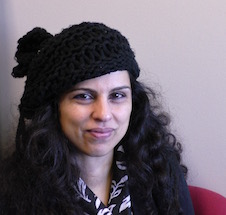 Mariam Abdul-Dayyem
Mariam Abdul-Dayyem
PhD candidate Sociology
We all know it – the internet and social media are rapidly changing our world and reshaping the nature of humanity. But Mariam Abdul-Dayyem says a lot of our knowledge is taken for granted – we don't actually know what is really happening.
A curiosity to understand this led Mariam to her PhD topic – the impact of social media on social movements within the Israel-Palestine conflict.
“Social media is challenging traditional sociology because the socialisation isn't happening face to face – its virtual. It's interesting to see how sociology can adapt and deal with these changes.”
“Quite a lot of research focused on the internet is out-dated; when the internet was first invented people would go to internet cafes, to universities, to public places, now everyone has the internet in their hands (smart phones). There is a big need, all the time, for new research.”
A PhD in Sociology wasn't always on the cards for Mariam, who originally did her bachelor's degree in Chemistry.
“I have worked in many fields such as teaching and for the Coca-Cola Company and realised I didn't want to work purely in science – I wanted to work more with people so I started a master's degree in Sociology.”
Originally from Palestine, Mariam completed her masters at Hebrew University in Jerusalem, exploring student perceptions of martyrs during conflict.
“From my masters I learnt there is a need for sociologists to be more active within their own research. I understood how important it was to have this discourse in the interviews with the people – it's about engaging the people in the question.”
This activist approach is one Mariam plans to bring into her PhD research.
It was friends from Hebrew University that recommended she come to the University of Otago for her PhD.
“My friend was studying here and she said it was like being on vacation. We are from crazy, crowded cities and it can take the energy out of you – in Dunedin you don't have to worry about that, you can just focus on study.”
“It's like paradise - I love the nature, I love the people, and maybe it's because we are in such a natural setting but there is something different about the rhythm and pace – it's nice and slow – you have this kind of relief.”